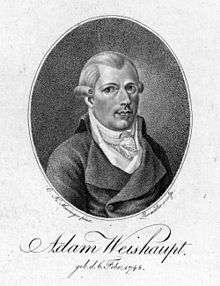Adam Weishaupt
| Adam Weishaupt | |
|---|---|

1799 portrait of Weishaupt
|
|
| Born |
Johann Adam Weishaupt 6 February 1748 Ingolstadt, Bavaria |
| Died | 18 November 1830 (aged 82) Gotha, Saxe-Coburg-Gotha |
| Era | Enlightenment era |
| Region | Western Philosophy |
| School | Empiricism |
|
Main interests
|
Epistemology, Metaphysics, Ethics |
|
Influences
|
|
|
Influenced
|
|
Johann Adam Weishaupt (6 February 1748 – 18 November 1830) was a German philosopher and founder of the Order of the Illuminati, a secret society.
Adam Weishaupt was born on 6 February 1748 in Ingolstadt in the Electorate of Bavaria. Weishaupt's father Johann Georg Weishaupt (1717–1753) died when Adam was five years old. After his father's death he came under the tutelage of his godfather Johann Adam Freiherr von Ickstatt who, like his father, was a professor of law at the University of Ingolstadt. Ickstatt was a proponent of the philosophy of Christian Wolff and of the Enlightenment, and he influenced the young Weishaupt with his rationalism. Weishaupt began his formal education at age seven at a Jesuit school. He later enrolled at the University of Ingolstadt and graduated in 1768 at age 20 with a doctorate of law. In 1772 he became a professor of law. The following year he married Afra Sausenhofer of Eichstätt.
After Pope Clement XIV’s suppression of the Society of Jesus in 1773, Weishaupt became a professor of canon law, a position that was held exclusively by the Jesuits until that time. In 1775 Weishaupt was introduced to the empirical philosophy of Johann Georg Heinrich Feder of the University of Göttingen. Both Feder and Weishaupt would later become opponents of Kantian idealism.
...
Wikipedia
